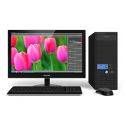Computerware Blog
The Desktop PC Isn’t Going Away Thanks to These 4 Reasons
Bucking this mobile trend, traditional desktop PCs are still going strong. They are the ideal choice to accomplish a variety of tasks; and therefore, will not die anytime soon. Here are four advantages that traditional desktops PCs have over their mobile counterparts.
More Powerful Components
Desktop PCs have always had the power advantage. While devices tend to get smaller and try to do more with less, desktop PCs have a standard tower size that comes with more powerful hardware with every upgrade. The tower design also allows for great heat distribution using fans and vents. Desktop PCs do not operate on a small battery, this enables PC components to not be limited by power consumption. These three design features allow for the desktop PC to use the newest and highest performance components. Essentially, the hardware design process has always rolled out the newest components first to the PC, and then everything is shrunken for the mobile device. In the eyes of the performance-minded consumers, like graphic artist and PC gamers, desktop PCs will always be the option that offers the most power.
Computing on a Budget
Desktop PCs have always been great at providing more bang for the buck. As is the case with all technology, the newest PCs are a bit on the expensive side, but if you go back one or two generations, you can find high performance models at discounted prices. Ten years ago, the price tag on the most powerful PC was a few grand. Today, it is easy to find a high performance PC for way less than $1000. When shopping for a computer, you have to ask yourself, how important is mobility? Virtually every piece of hardware is more expensive when it is condensed down to fit inside a laptop or similar device; so if mobility is not a priority, then you can save some major coinage.
Easy to Repair
Desktop PCs have a little extra room inside to dig around and replace parts if something goes wrong. This extra room can make repairs easy, or at least easy to learn. With a mobile device, everything is crammed into a small space, this can make repair work look like brain surgery. It is because the devices are so compact and so complex, that most manufacturers recommend you send the broken gadget to them to be fixed. If you attempt to repair a mobile device on your own, you may even void the warranty just by opening the product.
Physical Security
Here are two sobering statistics on laptop theft from Kensington ClickSafe: 1 out of 10 laptops are stolen in the course of their lifetime, and 86% of IT security practitioners report that someone in their organization had a laptop lost or stolen. It is easy to have your laptop swiped if you turn your back at a coffee shop, it takes a little more effort for a burglar to bust down your front door and make off with your desktop.
Is the desktop still your primary computer, or have you completely gone mobile? Or perhaps you have you found a balance between the two? Feel free to share your thoughts in the comments!


Comments